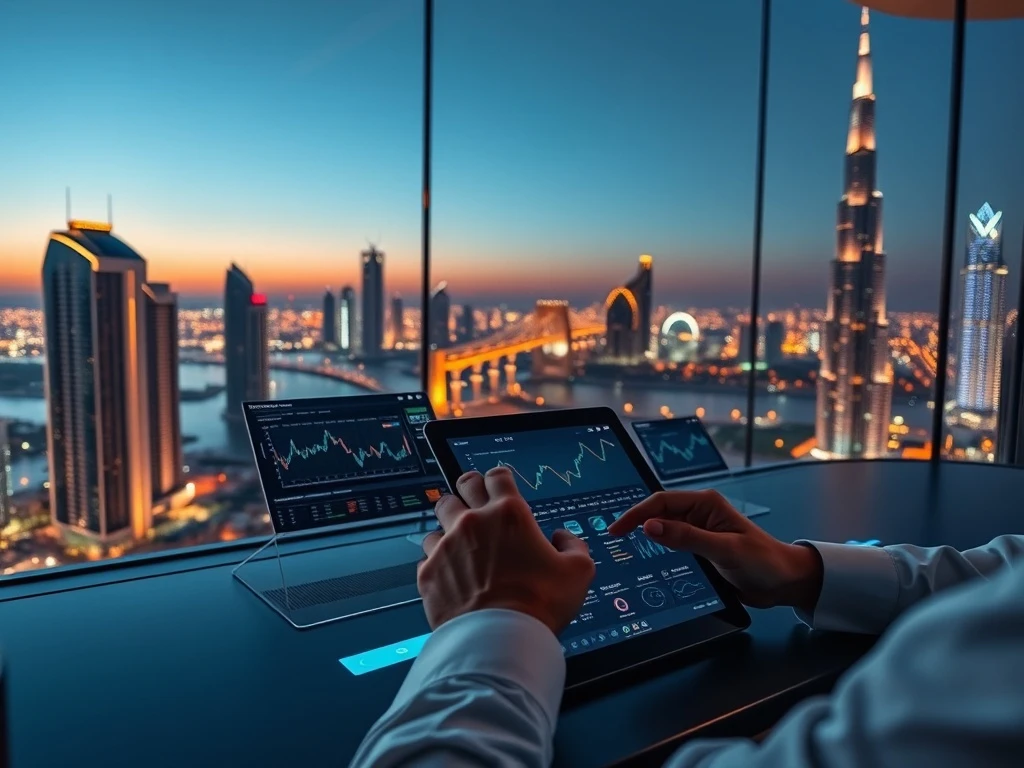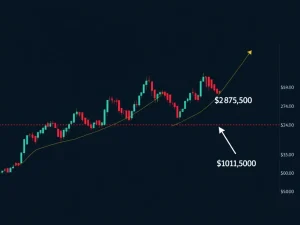Crypto Options Dubai: Nomura’s Laser Digital Unlocks Revolutionary Regulated Trading

The world of cryptocurrency trading is rapidly evolving, with institutional players increasingly seeking regulated avenues. A groundbreaking development has just emerged from the heart of the Middle East. Nomura’s digital asset arm, Laser Digital, has secured a pivotal regulatory approval in Dubai. This landmark achievement positions them to launch the first regulated over-the-counter (OTC) desk for crypto options in the region. This move marks a significant stride for institutional crypto adoption, especially concerning crypto options Dubai, setting a new precedent for digital asset derivatives.
Pioneering Regulated Crypto Options Dubai
Laser Digital, the digital asset subsidiary of Japan’s investment banking giant Nomura, has achieved a significant milestone. They became the inaugural entity licensed under Dubai’s Virtual Asset Regulatory Authority (VARA) pilot framework. This crucial “limited license” allows Laser Digital to provide regulated over-the-counter (OTC) crypto options to its institutional clientele. This development is not merely a business expansion; it solidifies Dubai’s burgeoning role in the global digital derivatives landscape. VARA’s approval underlines a commitment to fostering a secure and regulated environment for virtual assets.
This initiative directly addresses the growing demand from institutional investors for sophisticated and compliant trading mechanisms. Such clients often require bespoke solutions for managing their digital asset portfolios. Laser Digital plans to offer essential tools for:
- Hedging strategies: Protecting against price volatility.
- Yield generation: Creating returns from existing crypto holdings.
- Volatility management: Navigating market fluctuations effectively.
Regulators will closely assess market readiness and risk controls. This cautious approach precedes any broader expansion of services. This ensures a robust and stable foundation for future growth in Dubai’s digital asset ecosystem.
Understanding Regulated Crypto OTC Desks
Over-the-counter (OTC) desks serve as crucial conduits for large-volume digital asset trades. These platforms allow institutions to execute significant transactions directly with counterparties. This direct approach offers several distinct advantages over traditional exchange trading. It minimizes slippage, a common issue with large orders on open markets. Furthermore, it enables more flexible and often more favorable pricing for substantial trades. Consequently, OTC desks are indispensable for high-volume players.
Typical users of these specialized desks include:
- Hedge funds: Managing complex investment strategies.
- Asset managers: Handling extensive client portfolios.
- Proprietary trading firms: Executing large-scale trades.
- Other institutional clients: Requiring tailored trading solutions.
The launch of a regulated crypto OTC desk by Laser Digital signifies a maturation of the crypto market. It provides a much-needed layer of security and compliance. This regulatory oversight is vital for attracting more traditional financial institutions. These institutions often require strict adherence to regulatory standards before entering new asset classes. Dubai’s proactive stance in regulating this sector provides a clear pathway for such participation.
Laser Digital Nomura: A Strategic Move
Nomura’s decision to launch Laser Digital as its dedicated digital asset subsidiary highlights a forward-thinking strategy. The traditional financial giant recognizes the transformative potential of blockchain technology and digital assets. By establishing Laser Digital Nomura, the bank has positioned itself at the forefront of crypto innovation. This strategic move allows Nomura to explore new revenue streams and serve an evolving client base. The firm is actively bridging the gap between traditional finance and the burgeoning digital economy.
Laser Digital’s expansion into Dubai aligns perfectly with Nomura’s global ambitions. Dubai has rapidly emerged as a key hub for virtual assets, offering a clear and comprehensive regulatory framework. This clarity contrasts with the more fragmented regulatory landscapes found elsewhere. The move demonstrates a commitment to regulated growth within the digital asset space. It also reflects confidence in Dubai’s ability to foster innovation while maintaining market integrity. This strategic alignment will likely attract more institutional capital to the region, further cementing Dubai’s status as a global financial center.
The Global Landscape of Crypto Derivatives Regulation
Global regulation of OTC crypto options remains in its nascent stages. However, a growing number of jurisdictions are beginning to establish frameworks. Dubai and the United Kingdom currently lead the way in this critical area. For instance, in December 2023, M&G, a UK-based pension giant, invested $20 million in GFO-X. This marked the UK’s first regulated Bitcoin derivatives exchange. This funding was part of a $30 million Series B round. The aim was to launch a Financial Conduct Authority (FCA)-regulated platform for Bitcoin index futures and options.
Across the European Union, crypto derivatives fall under broader financial regulations. These include MiFID II (Markets in Financial Instruments Directive II) and EMIR (European Market Infrastructure Regulation). These regulations impose strict reporting and clearing requirements. However, most member states have yet to introduce crypto-specific OTC licensing frameworks. This creates a patchwork of rules and often leaves institutional players seeking clearer guidance. In contrast, the United States’ CFTC (Commodity Futures Trading Commission) permits some institutional trading of crypto derivatives under existing laws. Nevertheless, a dedicated licensing framework for OTC crypto options desks is still absent. This regulatory gap often forces institutions to navigate complex and sometimes ambiguous legal terrain.
Dubai, by comparison, implemented its comprehensive crypto regulatory framework early in 2023. This framework includes detailed rulebooks covering exchanges, custodians, broker-dealers, and token issuers. All these activities fall under the purview of VARA. This proactive and holistic approach by VARA provides a clear and robust regulatory environment. Such clarity is essential for attracting top-tier financial institutions. The specific licensing for VARA crypto license holders like Laser Digital sets a global benchmark. It demonstrates how clear regulation can foster innovation and secure market growth.
Dubai Crypto Derivatives: A Growing Hub
The United Arab Emirates’ derivatives market, while smaller than the US market, is experiencing steady growth and diversification. Valued at approximately $167 million in 2024, it projects an annual growth rate of 3.7% through 2031. Traditional platforms, such as the Dubai Gold & Commodities Exchange (DGCX), have long served the region. Additionally, OTC providers like ADSS have catered to the commodities and FX markets. However, the UAE is now strategically broadening its scope. It aims to include digital assets and advanced institutional financial products.
While the US still dominates global derivatives through exchanges like CME and CBOE, the UAE is carving out a distinct niche. It offers clear and progressive regulation for emerging asset classes like cryptocurrencies. This strategic focus positions Dubai as a competitive alternative for global financial players. The push into Dubai crypto derivatives is part of a broader national vision. This vision aims to establish the UAE as a leading global hub for future-oriented industries. The clear regulatory environment attracts businesses and investors seeking certainty and innovation. This creates a powerful synergy between technological advancement and financial stability. This robust framework will continue to draw significant investment and talent to the region.
Implications for Institutional Crypto Adoption
The launch of Laser Digital’s regulated OTC desk in Dubai holds profound implications for institutional crypto adoption. It signals a growing confidence among traditional financial powerhouses in the digital asset space. Regulation is a key enabler for institutions. They require legal clarity and robust oversight to manage risks and comply with internal mandates. This development provides precisely that. It reduces the perceived risks associated with crypto investments. This will encourage more mainstream financial institutions to allocate capital to digital assets. Consequently, it accelerates the integration of cryptocurrencies into global financial systems.
Moreover, this move by Nomura’s Laser Digital enhances Dubai’s reputation as a forward-thinking financial center. It demonstrates the city’s ability to adapt and innovate in a rapidly changing global economy. The availability of regulated options trading tools will also facilitate more sophisticated investment strategies. These strategies include hedging existing positions or generating yield from digital assets. Such tools are standard in traditional finance. Their introduction to the crypto market under a regulated framework is a crucial step towards broader institutional acceptance. This fosters a more mature and stable market environment for all participants.
In conclusion, Laser Digital’s launch of the first regulated OTC crypto options desk in Dubai is a monumental step. It highlights Dubai’s progressive regulatory environment and its ambition to become a global leader in digital finance. This development will undoubtedly pave the way for increased institutional participation. It also sets a new standard for regulatory clarity in the evolving world of crypto derivatives. As more institutions seek secure and compliant avenues, Dubai’s pioneering efforts will likely serve as a model for other jurisdictions worldwide.









